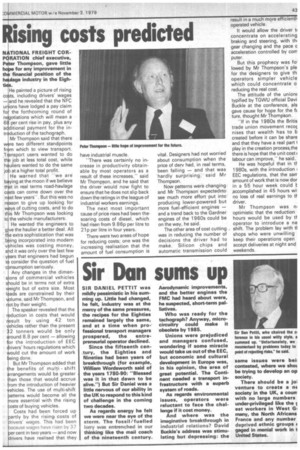Rising costs predicted
Page 45

If you've noticed an error in this article please click here to report it so we can fix it.
NATIONAL FREIGHT CORPORATION chief executive, Peter Thompson, gave little he for any improvement in the) financial position of the lags industry in the Eigh
ti
He painted a picture of rising costs, including drivers' wages — and he revealed that the NFC u ions have lodged a pay claim fo the forthcoming round of n otiations which will mean a 6 per cent rise in pay, plus any
a ditional payment for the intr duction of the tachograph. Mr Thompson said that there w re two different standpoints fr III which to view transport. ,T nsport users wanted to do
t job at less total cost, while h uliers wanted to do the same jo at a higher total profit.
He warned that we are b ying at the moon if we believe that in real terms road-haulage c sts can come down over the n xt few years' ' . But this was no r ason to give up looking for ys of cutting costs, and to do ails Mr Thompson was looking tq the vehicle manufacturers.
I He wanted the engineers to give the haulier a better deal. All tftie extra sophistication that was being incorporated into modern vehicles was costing money, arid it was only over the last few yPars that engineers had begun tO consider the question of fuel nsumption seriously.
Any changes in the dimen s ons of commercial vehicles s ould be in terms not of extra eight but of extra size. Most I ads are constrained by their olume, said Mr Thompson, and ot by their weight.
The speaker revealed that the duction in costs that would esult by using 42 ton ehicles rather than the present 2 tonners would be only 4round 8.8 per cent — allowing or the introduction of EEC (Orivers' hours regulations which 4vould cut the amount of work theing done. iBut Mr Thompson added that he benefits of multi shift rrangements would be greater han those that would accrue rom the introduction of heavier ehicles. The use of multi-shift 3atterns would become all the -nore essential with the rising osts of buying vehicles.
Costs had been forced up : aartly by the rising, costs of rivers' wages. This had been aecause wages have risen by 37 Der cent in two years — and now drivers have realised that they
have industrial muscle.
"There was certainly no increase in productivity obtainable by most operators as a result of these increases," said Mr Thompson, and he said that the driver would now fight to ensure that he does not slip back down the ratings in the league of industrial workers earnings.
The next most important cause of price rises had been the soaring costs of diesel, which had risen from 9.86p per litre to 21p per litre in four years.
There were two areas of hope for reducing costs; one was the increasing realisation that the amount of fuel consumption is vital. Designers had not worried about consumption when the price of dery had, in real terms, been falling — and that was hardly surprising, said Mr Thompson.
Now patterns were changing and Mr Thompson expectedtto • see much more effort put into producing lower-powered but more fuel-efficient engines — and a trend back to the Gardner engines of the 1960s could be on the way, he said.
The other area of cost cutting was in reducing the number of decisions the driver had to make. Silicon chips and automatic transmission could result in a much more efficientl■ operated vehicle.
It would allow the driver b concentrate on accelerating
braking and steering, with th, gear changing and the pace c acceleration controlled by corr puter.
But this prophecy was fo' lowed by Mr Thompson's pie for the designers to give th operators simpler vehicle which could concentrate o reducing the real cost.
The attitude of the union: typified by TGWU official Davi Buckle at the conference, als gave cause for hope for the ft ture, thought Mr Thompson.
"If in the 1980s the Britis trade union movement recc:q nises that wealth has to b created before it can be share and that they have a real part I play in the creation process,the there is hope that the unit cost labour can improve," he said.
He was hopeful that in tf 1980s, with the introduction EEC regulations, that the sarr amount of work that is now dor in a 55 hour week could accomplished in 45 hours wi' no loss of real earnings to tf driver.
Mr Thompson was ni optimistic that the reduction hours would be used by tf operator to introduce a ne shift. The problem lay with ti shops who were unwilling keep their operations open accept deliveries at night and weekends.




























































































































